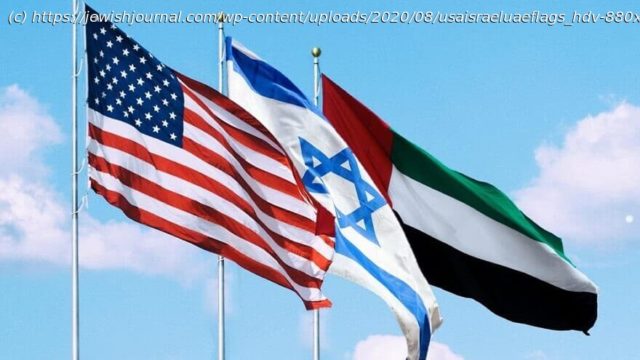The Israel-UAE agreement is merely a prop in the choreography for a much bigger drama.
(JNS) “The major issue is not [attaining] an agreement, but ensuring the actual implementation of the agreement in practice. The number of agreements which the Arabs have violated is no less than number which they have kept.” — Shimon Peres, Tomorrow Is Now, Keter: Jerusalem, p.255 “Poor Menachem… After all, I got back… the Sinai and the Alma oil fields, and what has Menachem got? A piece of paper.” — Former Egyptian President Anwar Sadat in The New York Times, Oct.19,1980 “Qatar established trade relations with Israel in 1996, the first state bordering the Persian Gulf to do so. In 2000, Israel’s trade office in Qatar was closed down by authorities. Qatar permanently severed trade relations with Israel in 2009 following ‘Operation Cast Lead.’ ” — Professor Uzi Rabi, The Middle East Journal, Vol.63, No.3, Summer 2009 Since Aug.13, when it was made public, rivers of ink have been spilled analyzing the pro and cons of the Israel-UAE peace (or rather, “normalization”) deal weighing the prospective rewards against the potential risks. There was speculation as to how it upended past precedents that dictated approaches to the perennially faltering “peace process,” as well as conjecture as to whether other “moderate” Arab states (read “nepotistic despotic Sunni sheikdoms”) will follow suit and forge a similar compact with the Jewish state. While all these aspects are certainly pertinent and worthy of attention, in many respects, they miss the major point: The agreement is merely a prop in the choreography for a much bigger drama. After all, formalizing the ongoing relationship between Israel and the United Arab Emirates, which despite its perceptions of great affluence and opulence has a GDP per capita lower than Israel’s and a domestic population of around 1 million(almost 90 percent of the UAE population are migrants/expatriates), is hardly likely to be a measure with enormous strategic significance. Beyond the considerations of the agreement’s permanence, potential and possible extension, the issue that is liable to have the most profound and durable strategic impact for Israel is whether the Israel-UAE agreement will reap the Trump administration sufficient credit to nudge it to victory in the November elections. Clearly, Israel will find itself in two very different — indeed, divergent — strategic universes depending on who wins that crucial ballot. It will be one thing if the largely pro-Israel GOP, with its strong evangelical Christian base, is victorious, and quite another thing if the increasingly anti-Israel Democratic Party with its vociferous and ever-more dominant radical wing carries the day. Two divergent strategic universes for Israel The outcome of the December polls will determine the fate of much for Israel, just as the outcome of the 2016 vote did. Had the result then gone as expected, the U. S. embassy would still be in Tel Aviv; there would be no U. S. recognition of Jerusalem as Israel’s capital; there would be no defunding of the fraudulent UNRWA or the pernicious PLO; there would be no American recognition of Israel’s sovereignty over the Golan; there would be no U. S. withdrawal from the atrocious 2015 Iran nuclear deal and punishing sanctions on Tehran; there would be no recognition by Washington of the legal standings of the Jewish communities beyond the 1967-Green Line. Some — indeed, possibly all — of these historic gains could well be reversed if the Democratic Party takes the White House. Therefore, if the Israel-UAE pact is received as a significant foreign-policy success for the Trump administration, which helps it retain power in the November polls, that would be the greatest strategic benefit that would derive from it for Israel. This does not mean that the emerging pact does not have inherent benefits in its own right. Much of the touted payoffs — both diplomatic and economic, perhaps even security — are not implausible prospects. However, it’s still early days to break open that champagne and celebrate their scope, and certainly their durability. A succession of castles in the sand In the past, agreements with Arab states have hardly lived up to the rosy expectations they raised when signed. This is certainly true with regard to the Oslo Accords, concluded with great pomp and ceremony in 1993 on the White House Lawn. Purported to usher in the dawn of a “New Middle East” from Kuwait to Casablanca, with peace and prosperity replacing animosity and aggression, it proved to instead to be a harbinger of trauma and tragedy for the Israelis, and death and destruction on an even larger scale for the Palestinian Arabs. Neither has the agreement with Jordan fostered much of the hoped-for harmony and reciprocal goodwill. Although the Hashemite regime, largely due to a sense of enlightened self-interest, has engaged in effective security cooperation with Israel and has managed to keep the Jewish state’s longest border relatively without incident, there is growing domestic resistance to the accord. As one Middle East analyst pointed out: “Although it has been more than twenty years since Jordan and Israel signed a historic peace agreement to end decades of war, many visitors to the region could be forgiven for thinking that the two sides remain enemies, particularly at a popular level.






